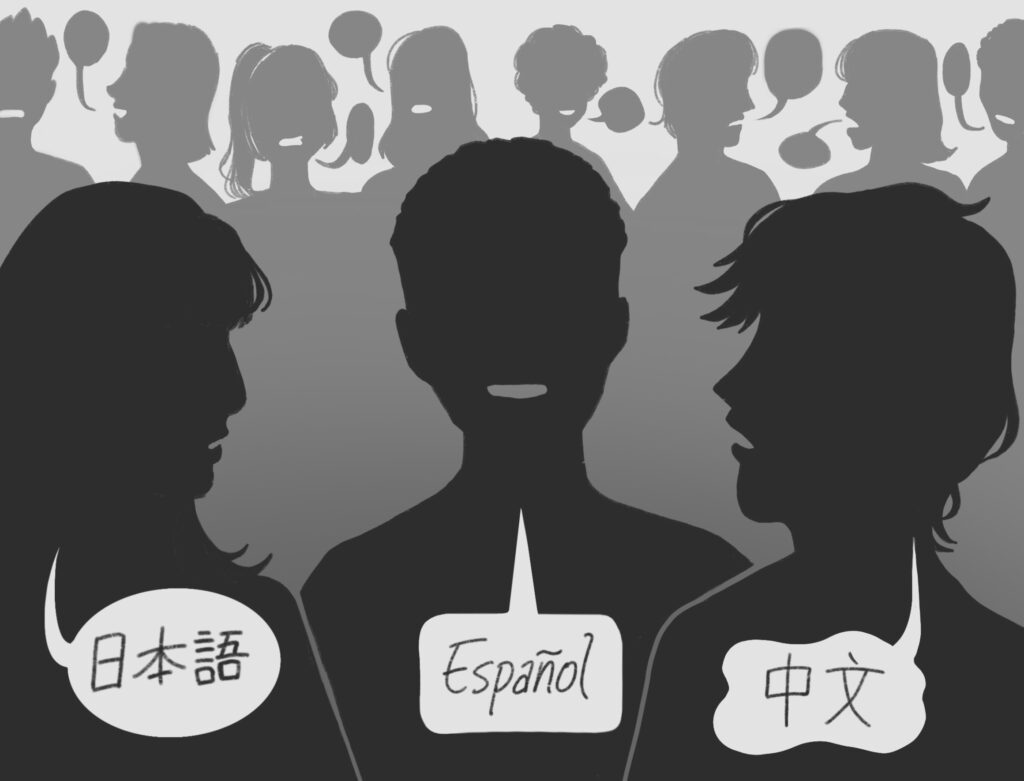
For many students at Aragon, a world language class just means getting a graduation requirement out of the way and picking up a new skill along the way. But for others, it positively exposes them to other cultures, history and even a connection to their family.
Through the continuous teachings of language, students are able to connect with the cultures and history of other countries.
“As students advance in the levels of language, they acquire a deeper understanding and hopefully appreciation of the culture or cultures that speak that language,” said Spanish teacher Ben Ho. “And they not only get a deeper understanding of the grammar and language structures, but also they come to understand the history of the cultures, the practices, the beliefs—everything that constitutes what that culture is all about.”
Venturing into other languages also exposes students to more worldly perspectives and learn about cultures and groups outside of their own ethnicity.
“I think it’s great just to learn about different cultures,” said senior Evan Li. “I’m actually pretty happy that I chose to take Spanish instead of Chinese because I got to learn a ton about Spanish [and] Mexican culture, and explore a little bit instead of just sheltering myself in what I was comfortable with.”
On the practical side, being multilingual opens one to a new population; one not limited to those who speak English.
“I think being able to speak multiple languages is extremely powerful in that it opens doors for you.” Li said. “When you learn to speak a different language, you unlock millions of potential friends or business partners; you gain an entirely new method of acquiring the world’s information, and who knows, maybe your future significant other speaks a different language than you do now.”
Moreover, learning strategies and sentence structure used in these classes can also translate over to English.
“[Learning Japanese has] help[ed] me to improve my English grammar as well because now when I have my sentences, I find myself paying more attention to what words I’m using and what order they’re in,” said freshman Laura Wang. “It kind of helps to improve your grammar when you think about how [Japanese] culture works. And then you think about their sentences and you’re like, ‘oh, that kind of makes sense.’”
With people becoming more worldly and having a desire to travel the globe, they sometimes pick up a new language in order to communicate with locals.
I think being able to speak multiple languages is extremely powerful in that it opens doors for you
“Nowadays, people don’t just stay in one country,” Wang said. “They go out and explore and you also have to interact with people from other countries. So it’s good to understand other cultures and get yourself into the mindset of being able to think open mindedly about other people’s practices. So it helps you communicate and interact with other people better.”
But is the school held back by limiting their language options to Spanish, Mandarin and Japanese? Should Aragon implement classes for other languages? Considering that California’s population is very diverse and the school is composed of students from several ethnic groups, some believe it may be beneficial for students–those from minorities and those who are interested in learning more about other cultures–if there were other languages offered.
Freshman Anjalika Khare believes Hindi should be offered at Aragon due to the large presence of Indian culture both at school and in the world.
For Khare, it would be helpful, both on a cultural level and an intellectual level, to learn Hindi.
“As an Indian person myself, I don’t know Hindi,” Khare said. “I can understand it but if you wrote something out on a paper and ask[ed] me, ‘hey, read this,’ I can’t do that. And to get closer to my own culture [is] something I’d like to do, especially in an environment where it can be normalized to speak Hindi [or] to learn Hindi.”
It can also be especially difficult to be unable to converse with family members due to the language barrier.
“In my case I had trouble communicating with [grandparents and older relatives] because I can’t speak the language that they were born and raised with,” Khare said. “They don’t speak English, I don’t expect them to know how to speak English. I don’t speak Hindi, but they expect me to know because I’m the next generation that’s gonna carry on the culture. So again, [language classes mean] not only carrying your own culture’s language, it’s sharing with other people.”
And to get closer to my own culture [is] something I’d like to do
The language difference can also mean losing out on personal stories or knowledge.
“My grandparents have stories about the Indian Partition that they only remember in Bengali because they don’t know the English [translation],” said senior Urjaswee Debnath. “So until I learned Bengali, I could not access any of the stories because [they] didn’t write them down and [you] can’t re-translate them if you can’t write them down.”
Aragon’s Spanish, Mandarin and Japanese classes offer a way for students to connect with culture and history, but that may be precisely why offering a wider variety of languages would be beneficial. While the logistics of such a proposition would prove difficult, in an ideal world, languages from all across the globe would be taught.



